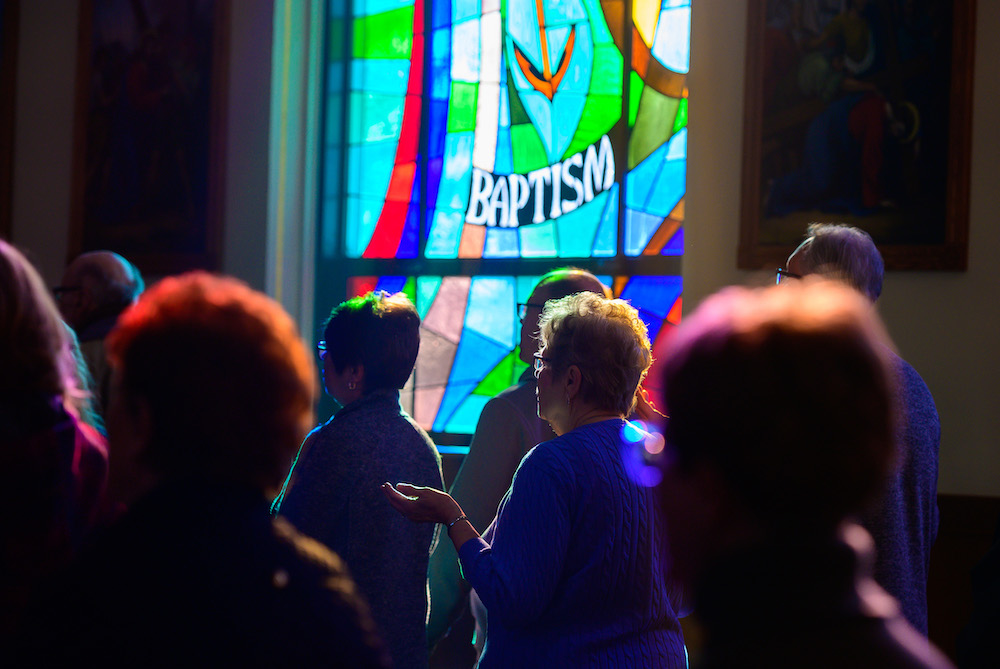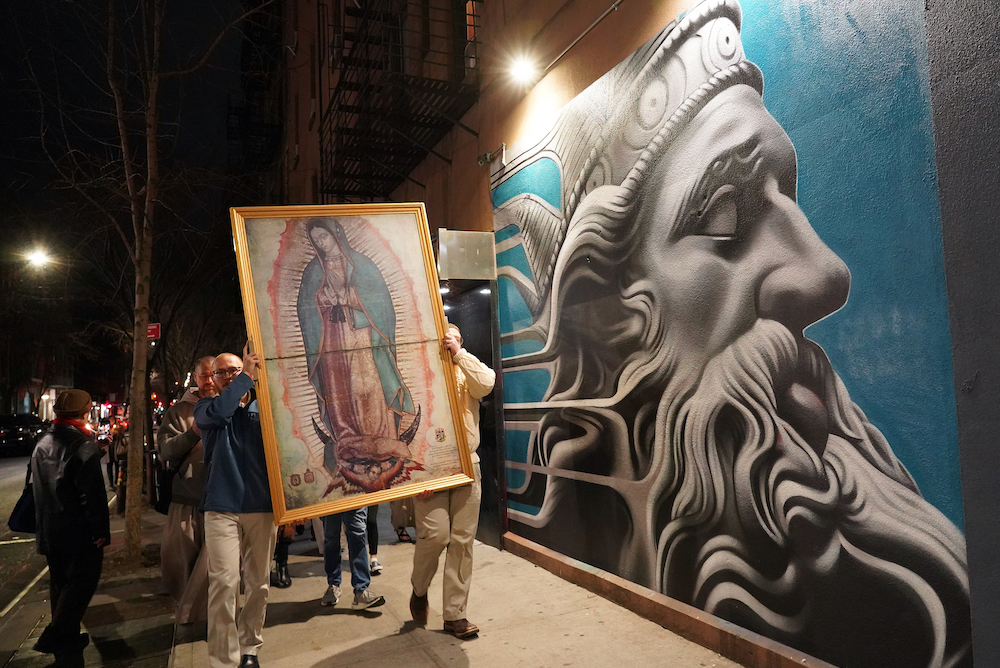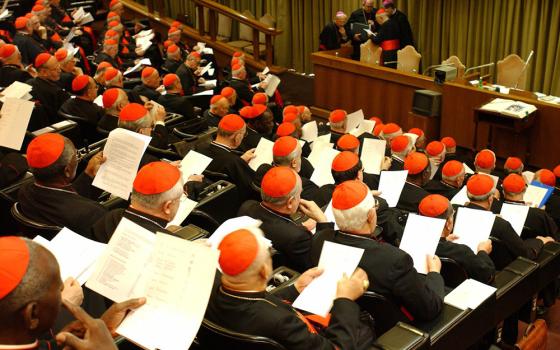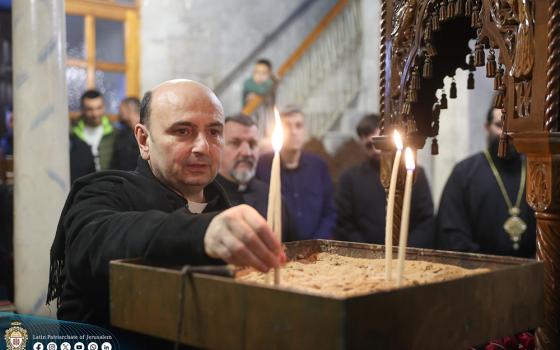
Parishioners of St. Mary Church in Algoma, Wisconsin, pray during Mass Feb. 23 as sunlight reflects through stained-glass windows. (CNS/The Compass/Sam Lucero)
In the United States, our practical theology has collapsed into political categories and ideas. Conservative Catholics, for example, do not feel obliged to care for the immigrant, the teaching of the church and explicit commands of sacred Scripture notwithstanding. Liberal Catholics, similarly, prefer to make excuses for those whose approach to abortion is essentially libertarian. And those of us who try mightily to cling to all the church's teachings, even when those teachings are very difficult to accept, we can get wrapped up in the culture wars also. As theologian Cathleen Kaveny recently noted in Commonweal,
… there are a growing number of Catholic "whole Catechism" culture warriors. Because they defend both the unborn and the refugee, and condemn both euthanasia and climate change, they see themselves as a bridge between left and right. But their use of prophetic indictment means they are more likely to be an isolated island of righteousness, congratulating themselves for their commitment to the full spectrum of Catholic moral teaching. For everyone else, the bridge they build is booby-trapped.
I felt myself duly spanked by her observation. It seems like there is no escaping the divisiveness that has seeped into the church from the ambient political culture. Columnists hurl slogans, not insights. Distinctions are shunned lest they expose something that helps "the other side."
How can we break out of this divisiveness? Perhaps the problem is deeper. Is the political dysfunction of our society not merely about politics? Is the migration of that dysfunction into the life of the church a symptom of divisive and irreconcilable ideas that are fundamentally cultural? Or, when we step back to examine our lives and values through the lens of culture, do the possibilities and the dangers take on different shapes?
This week, Pope Francis and the Roman curia are on their Lenten retreat. I should like to take the readers of Distinctly Catholic on a retreat as well, less spiritual and more intellectual. Instead of examining the issues of the day in our church and state as this column normally does, I should like to take a step back, a large step, all the way back to 1951. That was the year that H. Richard Niebuhr published Christ and Culture. Last autumn, I decided to re-read this classic work to see what light, if any, it might shed on current situations. Alas, the light was almost blinding at first. The book has lost none of its relevance since its first publication. Since reading it again, and in the rush of events since, I have necessarily written about more timely issues, but the ideas this book unleashed have been steeping in my mind.
For each of the next four days, I will enter into dialogue with Niebuhr and offer some commentary on the five distinct resolutions of the issue of Christ and culture that Niebuhr identifies. Those distinct stances on the issue are: Christ against culture, Christ of culture, Christ above culture, Christ and culture in paradox and Christ the transformer of culture.
I will also include some fairly long block quotes. This makes editors roll their eyes, but I have two reasons for doing so. First, the metaphors Niebuhr uses are rich and highly developed, and it seems criminal to summarize or truncate them. Second, the elegance of his prose is worth sharing. I had forgotten how beautifully written this book is. At the conclusion of my survey, I hope to show how Niebuhr's work invites new directions for the Catholic community.
Today we will examine the first stance, Christ-against-culture. Niebuhr writes:
The first answer to the question of Christ and culture we shall consider is the one that uncompromisingly affirms the sole authority of Christ over the Christian and resolutely rejects culture's claim to loyalty. It seems to be both logically and chronologically entitled to the first position: logically, because it appears to follow directly from the common Christian principle of the Lordship of Jesus Christ; chronologically, because it is widely held to be the typical attitude of the first Christians. Both claims are subject to question, yet it must be conceded that the answer was given at a very early time in the history of the church, and that on the surface it seems to be logically more consistent than the other positions. (p.45)
Among the adherents of this position, Niebuhr cites Tertullian, the main strains of monasticism, the Mennonites and Leo Tolstoy. It would be easy to identify this group, which Niebuhr calls exclusivist or radical Christians, with today's culture warriors, but that is not really true: The culture warrior approach today is as much about style as first principles. And in both style and principle, the Kings Bay Plowshares activists are as committed to the Christ-against-culture approach as are those who insist the church must fire LGBT people who marry because they are a counter witness to the church's teaching on family.
Nonetheless, all Christians must of necessity at times question the culture to which they belong and to do so on the basis of the Lordship of Jesus Christ. The First Letter of John, as well as the book of Revelation and parts of the Gospel of Matthew, all evidence the tendency, especially the first: "Do not love the world or anything in the world. If anyone loves the world, love for the Father is not in them" (1 John 2:15).
This stance is capable of heroism, which is also one of its temptations. "They have not taken easy ways in professing their allegiance to Christ," Niebuhr writes (p.66) even if, in our day and not in his, the idea of withdrawal from the world to preserve some kind of Christian purity is an idea that carries with it a lessening of the burdens unique to modernity. And, of course, a sense of certainty brings its own alleviation of stresses.
The idea of withdrawal as a means of rejecting culture in favor of Christian dominion cannot be allowed to become itself a mystical form of cultural purity. Rod Dreher's book The Benedict Option was an interesting thought experiment, nothing more. Here is Montalembert via Niebuhr:
What Montalembert said of Benedict of Nursia applies in one way or another to almost all the great representatives of exclusive Christianity: "Historians have vied in praising his genius and clear-sightedness; they have supposed that he intended to regenerate Europe, to stop the dissolution of society, to prepare the reconstitution of political order, to re-establish public education, and to preserve literature and the arts. … I firmly believe that he never dreamt of regenerating anything but his own soul and those of his brethren, the monks." Doubtless the individualistic ideal of soul-regeneration is not an adequate key to the attitude of radical Christians; but neither is the hope of social reform. (p.66-67)
There is something undeniably serious about the radical, exclusivist Christians, although we are right to wonder if the kind of sincerity and single-mindedness of Benedict is even possible today, still less to turn this great historical figure and his approach to Christian living into a useful contemporary ecclesial strategy. Similarly, as the bishops of the Catholic Church in this country pursue a maximalist understanding of religious liberty, it is important to remind our bishops that we are not Amish. We Catholics do not withdraw from culture, at least not most of us.
Niebuhr is deeply respectful of the radical Christian position, but he also explores its limits, some of which are evident and foundational:
So long as eternity cannot be translated into temporal terms nor time into eternity, so long as Christ and culture cannot be amalgamated, so long is the radical answer inevitable in the Church. It is an inevitable answer; but it is also inadequate, as members of other groups in the church can easily point out. It is inadequate, for one thing, because it affirms in words what it denies in action; namely, the possibility of sole dependence on Jesus Christ to the exclusion of culture. Christ claims no man purely as a natural being, but always as one who has become human in a culture; who is not only in culture but into whom culture has penetrated. Man not only speaks but thinks with the aid of the language of culture. … If Christians do not come to Christ with the language, the thought patterns, the moral disciplines of Judaism, they come with those of Rome; if not with those of Rome, then with those of Germany, England, Russia, America, India, or China. Hence the radical Christians are always making use of the culture, or parts of the culture, which ostensibly they reject. (p.69)
We see this certainly in the Word on Fire ministry with its reliance on the media and methods of the culture from which they wish to stand apart — and above. In a video Los Angeles Auxiliary Bishop Robert Barron prepared on the "Heroic Priesthood," we see this standing apart while aping the culture quite vividly, in the glossy editing and sweeping music but also in the choice of subject: the seminarians are seen playing basketball and then at prayer, then back at the gym, then back at prayer, dressed "like a guy" and then dressed in clerical attire.
The desire of some of today's culture warriors to stand apart and above, to replace evangelization with apologetics, to pine for an earlier and more simple time, the constant complaints about contemporary society and culture, all of these have not only failed to revivify the Christian proposition in society, but they often rest on a faulty diagnosis and/or a faulty remedy. Niebuhr writes:
For one thing, the demands of Christ for holiness of life meet resistance in the Christian himself; not apparently because he has inherited culture, but because he has been given a certain nature. The ascetic practices of the radicals, from Tertullian to Tolstoy, in dealing with sex, eating and fasting, anger, and even sleep, indicate how great their awareness is that temptation to sin arises out of nature as well as culture. More significant is their understanding that one of the distinctions between Christianity and secularism is that the Christian faces up to his sinfulness. "If we say we have no sin," writes John, "we deceive ourselves and the truth is not in us." … If the greatest sin is the refusal to acknowledge one's sinfulness, then it becomes impossible to make the line between Christ's holiness and man's sinfulness coincide with the line drawn between the Christian and the world. Sin is in him not outside his soul and body … the strategy of the Christian faith in gaining victory over the world needs to include other tactics than those of withdrawal from culture and defense of new-won holiness. (pp. 78-79)
It always bothers me when some prelate denounces secularism and the "dictatorship of relativism" as if those not within the fold were manifestly devoid of moral reasoning. In my experience, most secular people try to do what is right; they make great exertions on behalf of their children or their parents; they are involved in their communities. They may not be able to defend their decisions by citing Scripture, but to simply assume all of them just finished some modern anti-religious philosophic tract is silly. It is not, to use Niebuhr's phrase, an adequate "strategy of the Christian faith in gaining victory over the world."
Advertisement
Niebuhr then turns to what is often another problem found among the radical Christians of our day, a kind of Pelagianism that one is surprised to find operative, but there it is.
Closely connected with these problems is the question about the relation of law and grace. Opponents of the exclusive type frequently accuse its representatives of legalism, and of neglecting the significance of grace in Christian life and thought; or of so emphasizing the character of Christianity as a new law for a select community that they forget its gospel to all men. This much is true, that they all insist on the exhibition of Christian faith in daily conduct. How can a follower of Jesus Christ know that he is a disciple if his conduct in love of the brothers, in self-denial, in modesty, in nonresistance, and in voluntary poverty does not distinguish him from other men? The emphasis on conduct may lead to the definition of precise rules, concern for one's conformity to such rules, and concentration on one's own will rather than on the gracious work of God. (p.79)
There is something there that stands, also, as a challenge to many Catholic liberals. Look at the list of attributes Niebuhr almost reflexively offers as marking the qualities of a follower of Jesus: those who become activists for reform tend not to be strong on self-denial or modesty and indeed the left's obsession with identity politics demands an assertion of self or group, an assertion that finds no warrant in the Gospels.

A Missionary Image of Our Lady of Guadalupe, patroness of the unborn, is carried by two men during a candlelight procession to a Planned Parenthood center following a pro-life Mass Feb. 24 at the Basilica of St. Patrick's Old Cathedral in New York City. (CNS/Gregory A. Shemitz)
One of the qualities of this book that I find most attractive is the generosity with which Niebuhr relates his characterization of the groups and people he examines. His criticisms are poignant and precise, but never mean. Consider this passage when he examines how the radical Christians sometimes ends up in strange places, flirting with heresy and with spiritualism:
The knottiest theological problem raised by the Christ-against-culture movement is the problem of the relation of Jesus Christ to the Creator of nature and Governor of history as well as to the Spirit immanent in creation and in the Christian community. Some exponents of radical Christianity, such as certain sectarians and Tolstoy, regard the doctrine of the Trinity as having no ethical meaning, and as the corrupt invention of a corrupt church. But they cannot escape the problem with which it deals and they try to solve it in their own way. … Their rejection of culture is easily combined with a suspicion of nature and nature's God; their reliance on Christ is often converted into a reliance on the Spirit immanent in him and the believer; ultimately, they are tempted to divide the world into the material realm governed by a principle opposed to Christ and a spiritual realm guided by the spiritual God. Such tendencies are evident in Tertullian's Montanism, in Spiritual Franciscanism, in the inner light doctrine of the Quakers, and in Tolstoy's spiritualism. At the edges of the radical movement the Manichean heresy is always developing. If on the one hand this tendency leads exclusive Christianity to obscure the relation of Jesus Christ to nature and to the Author of nature, it leans on the other to loss of contact with the historical Jesus Christ of history, for whom a spiritual principle is substituted. … Tolstoy substitutes for the Jesus Christ of history the spirit immanent in Buddha, in Jesus, in Confucius, and in himself. Why radical Christians should be so subject to the temptation of spiritualism that leads them away from the principle with which they begin, namely Christ's authority, is difficult to fathom. Perhaps it is indicated that Christ cannot be followed alone, as he cannot be worshipped alone; and that radical Christianity, important as one movement in the church, cannot itself exist without the counterweight of other types of Christianity. (pp. 80-82)
Niebuhr is not blind to the limits of the radical Christian perspective: the words "in himself" he applies to Tolstoy are devastating. Yet he sees the radical position as essential, or at least as legitimate, even while it is inadequate standing alone. Re-read that last sentence: I shall return to it later in the week. Niebuhr does not banish, even while he insists on a "counterweight" or balance.
It is easy to read these powerful passages and see in Niebuhr's criticisms the ideas of those with whom we disagree. But I invite the reader, today and with the subsequent passages, to try and see how these criticisms apply to ourselves too, how the strengths of a position we do not hold might serve as a balance or counterweight to our own attempts to follow the Lord Jesus and how our ecclesiological sensibilities can be enriched by looking, as Niebuhr does, at those whose views are different, with generosity as well as criticism.
[Michael Sean Winters covers the nexus of religion and politics for NCR.]
Editor's note: Don't miss out on Michael Sean Winters' latest. Sign up and we'll let you know when he publishes new Distinctly Catholic columns.







